Hi friends,
Welcome (back) to The Poppy Garden. I hope you receive what you need from this space.
It took me longer to press publish this month because February felt like a long, less amusing shift at the chocolate factory.
Life just kept piling on (literally, there was a pile of laundry in the corner of my room for most of the month…).
Thankfully, it occurred to me at some point that I should actually watch the full clip of the scene I referred to in my last post.
These three minutes brought the sacred nourishment of laughter into my soul and gave me an infusion of much-needed energy in a month full of unexpected grief and malaise.
Joy is a medicine I often avoid taking.
I told my dear friend over the phone how much I struggle to allow myself to feel joy and pleasure. With so much suffering in the world, it feels inappropriate (read: strange, awkward, unwarranted) to allow myself to bask in delight and share my bright moments with others.
She responded that she has the exact opposite tendency. With so much suffering in the world, it feels inappropriate to allow herself to admit when life is challenging and painful for her.
There is so much suffering in the world.1
And our joy and sadness still matter.
However, we often reject the truth of our experience because we believe our contentment doesn’t belong in a collective crisis and our despair doesn’t belong when considering our situation in contrast to others.
Or we believe our anxiety doesn’t belong in a life that we (stealthily) expect to be stable and controllable, and our disappointment doesn’t belong when we have so much to be grateful for.
Maybe we worry that our messiness doesn’t belong when productivity and organizational hacks make it seem so easy to be efficient, or our pleasure doesn’t belong when we recognize the pain of others.
And on and on…
So, what do we do with our feelings? Do we give them space to be felt, known, and honored? Or do we deny them because they do not fit in?
Once again, Pema Chödrön’s wisdom landed right in the middle of a troubling week as I opened up to a random page in her book When Things Fall Apart.
“When we are training in the art of peace, we are not given any promises that, because of our noble intentions, everything will be okay. In fact, there are no promises of fruition at all. Instead, we are encouraged to simply look deeply at joy and sorrow, at laughing and crying, at hoping and fearing, at all that lives and dies. We learn that what truly heals is gratitude and tenderness.”
“There are no promises of fruition at all.”
Her words felt like a strong wind, whooshing into my mind to reveal the blue sky behind the clouds. It gave me immense relief to take refuge in hopelessness at a time when nothing made sense.
Meanwhile, I also revisited Tara Brach’s podcast episodes on the importance of cultivating hope in difficult seasons of life.
For the month of February, my heart bobbed back and forth between the seas of hope and hopelessness.
I have decided I need both. (I am tempted to say “we” here, but I invite you to discern what you might be needing right now… glimmers of hope? or the soothing darkness and quiet of hopelessness?)
Right now, I am on a path of hopeless hope.
I define hope for myself as remembering to trust in possibility.
Hope is staying open to grace and trusting I am capable of doing hard things and navigating turbulence (even when I feel convinced that *this* will be the one time I won’t be able to get through it).
Hope is receiving the gifts of impermanence and realizing that change (a sacred mixture of loss and gain) makes magic, creativity, and growth possible.
When I breathe in, I fill up with the possibilities of hope, and I let myself imagine the beauty of what could be and consider the beauty of what already is.
And yet, I also let myself rest in the truth of hopelessness.
Hopelessness is a freeing recognition that I will never have “it” all “together,” and that is perfectly okay.
Hopelessness doesn’t make suffering a problem to fix, deny, or reject; it honors its inherent belonging as an experience to be felt, understood, and tended to with compassion.
Hopelessness is a steady reminder that struggling does not make me bad or wrong— it simply makes me human.
Hopelessness urges me to realize that I cannot wait to feel and express my joy until there is the absence of war, distress, or confusion.
When I breathe out, I surrender into the embrace of hopelessness and let go of trying to control everything. I release my grip on how I think things should be so that life can unfurl into the tender, beautiful, and brutal mystery that it is.
Hope and hopelessness go together like an inhale and an exhale. We need both to experience aliveness.
Who knows what will happen by the end of March?
As much as we attempt to avoid it, uncertainty is the true nature of every moment, and uncertainty is abundant with hope and hopelessness.
I don’t know what will unfold this month, this moon cycle, or this spring season.
I do know I want to continue to dignify my experience by allowing myself to swim in the oceans of hope and hopelessness—trusting that when the water swells and my toes can’t touch the sand, I will be carried by the waves wherever I need to go—and always, I will end up right in the center of this miraculous, mysterious, and magical moment, everchanging and everpresent with possibility.
Poetry for March
The paradox of hope coexisting with hopelessness emerged in one of the most precious moments of my life in March 2019. I was alone, preparing to say goodbye to an important city and end a transformative chapter in my life. I parked my car, noticed my surroundings, and wrote one of my all-time favorite and shortest poems. Let these words swirl within your heart several times, putting the emphasis on different words each time you say them, and notice what you notice.
there are bluebonnets in the cemetery.
Photography for March
I spent many blissful hours at the cemetery with the bees buzzing between bluebonnets. No words or images can accurately capture how special this ineffable experience was, but here’s a glimpse.
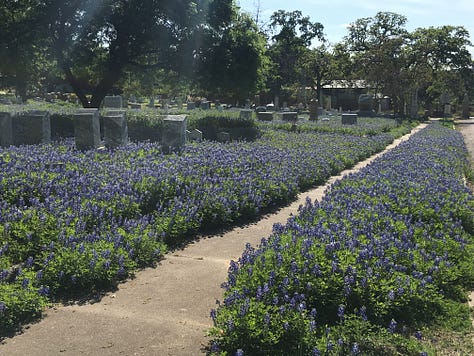
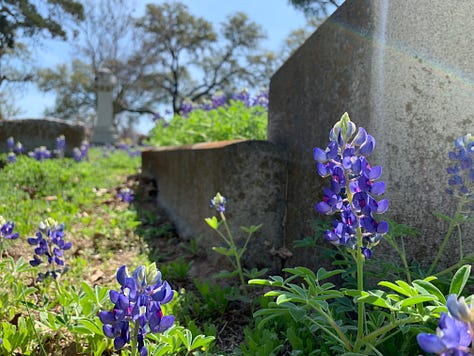
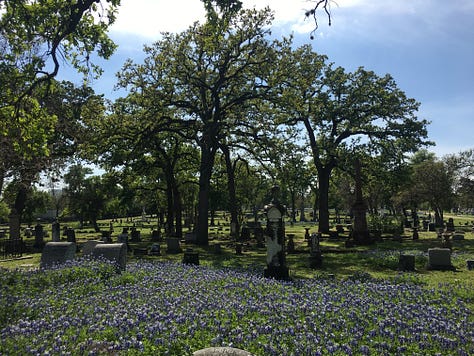
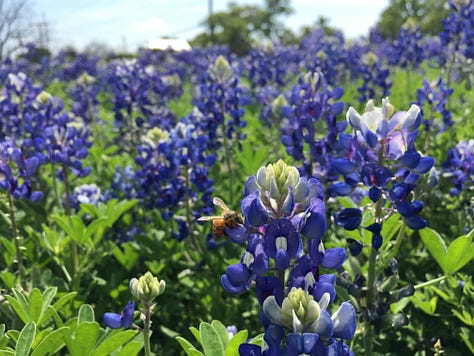

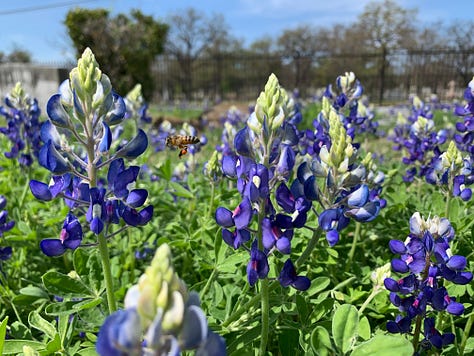



Practice for March
“We learn that what truly heals is gratitude and tenderness.” Pema Chödrön
To cultivate gratitude and tenderness, I invite you to ask yourself some questions. Teaching this practice is one of the most fulfilling things I do because what my students share in response is inspiring and clarifying. I encourage you to discuss this with someone else and enjoy the shared wisdom.
What do you need to remember on your tough days? What mindsets, practices, habits, or guidance would be supportive on those days?
What do you need to remember on your best days? What choices, perspectives, or actions did you take to help create the conditions for a great day?
Thank you for taking the time to be with me in The Poppy Garden. I’m *hoping* to be back later this month to explore setting intentions with the spring equinox.
If you haven’t already, please fill out this form and let me know what you’d like to see here. You’re also welcome to reach out and tell me how things are going for you. I’d love to hear how the message is landing!
I hope you find the support you need from hope and/or hopelessness.
Sending all my love & appreciation ✨
💜Marissa
P.S. If you are curious about deepening your practice and connection to nature on retreat, I’d love for you to join us. Either way, one more bonus practice for this month is to witness the hope and hopelessness of the changing seasons. Maybe, like me, you’re not quite ready for the increased activity that is expected at this time. Notice the buds that take their time to open and let yourself bloom at your own pace.
I appreciate Helen Keller’s perspective on the truth of suffering and the truth of resilience. Optimism/hope is a loving act of defiance. “Although the world is full of suffering, it is full also of the overcoming of it. My optimism, then, does not rest on the absence of evil, but on a glad belief in the preponderance of good and a willing effort always to cooperate with the good, that it may prevail.”
“The truth is inconvenient.” - Pema Chödrön




Dr. Knox, your writing is so valuable and precious! It’s the culmination of your life and experiences. This month’s post truly reflected that and it brings me so much joy you shared it with us ♥️ thank you!
Marissa,
Your writing is so full of wisdom and intelligent contemplation! Bearing witness to the deliberate suffering in the world, it’s so easy to feel powerless and slide down into grief and hopelessness and then feel guilty for taking the uplifting “medicine” of joy and hope. Your photo of the bee in mid-flight, amid the bluebonnets is amazing! When I noticed, it was a shot of joy!
I was really taken by your definition of hope, “Hope is receiving the gifts of impermanence and realizing that change (a sacred mixture of loss and gain) makes magic, creativity, and growth possible." I never even thought of the perspective of your definition of change as both loss and gain.
Your writing is so poetic. I could really visualize this line, “trusting that when the water swells and my toes can’t touch the sand, I will be carried by the waves wherever I need to go".
Now to the actual, formal poem.
there are bluebonnets
in the cemetery.
I was really left stunned after reading these six words. The ending period really hit me as the strongest expression of impermanence I’ve read and felt. These three words plus three words really sums it all up. It is so powerful and beautiful!
I almost hesitate to say this, because sometimes our flow can be disrupted by trying to live up to the judgment of others, fearing loss over gain, but I just have to say it, this is some of your best writing so far!
with gratitude,
Greg